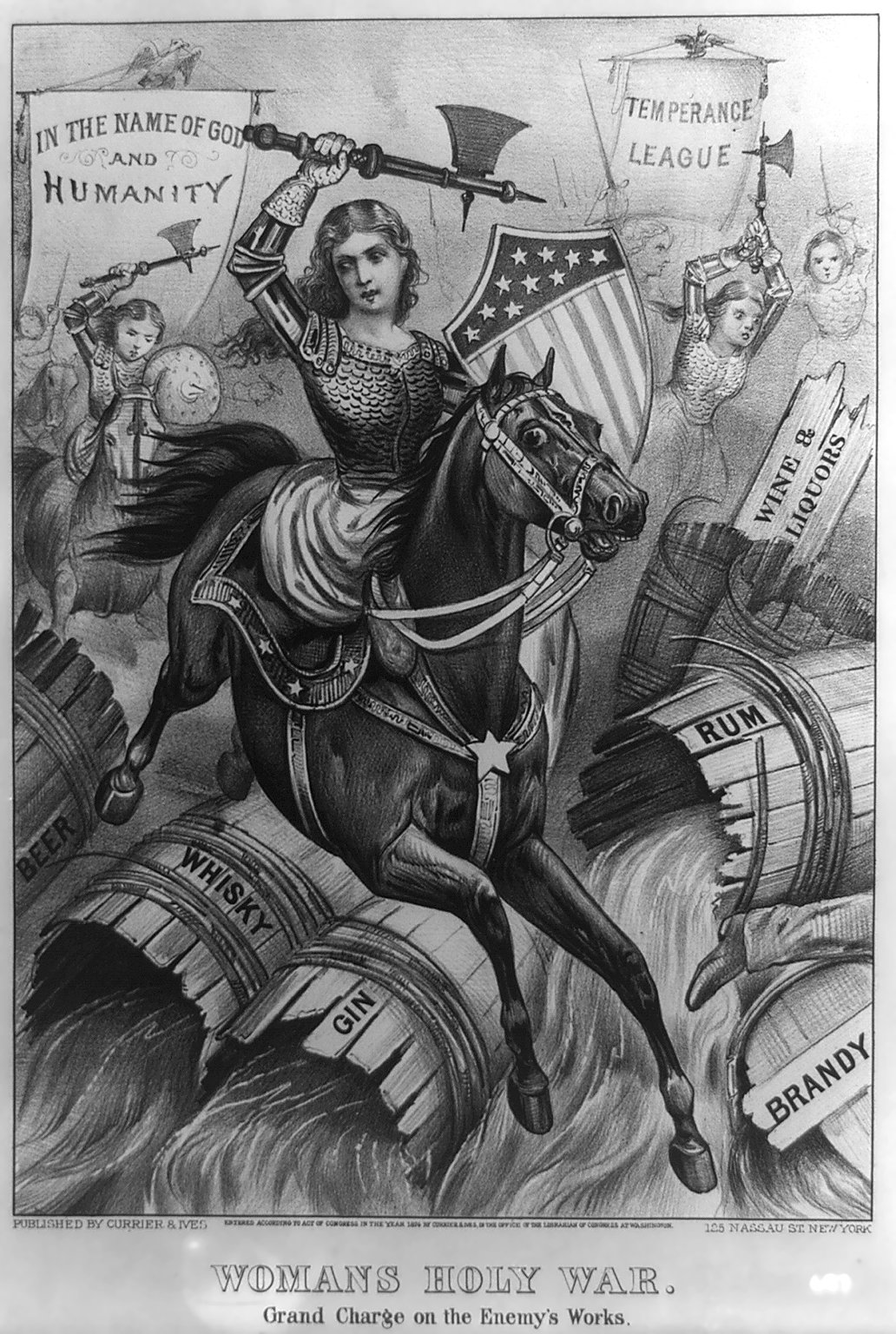|
Lincoln–Lee Legion
The Lincoln–Lee Legion was established by Anti-Saloon League-founder Howard Hyde Russell in 1903 to promote the signing of abstinence pledges by children. The organization was originally called the Lincoln League, named after Abraham Lincoln. However, in 1912 it was renamed the Lincoln–Lee Legion, adding a reference to Robert E. Lee in order to make it more appealing to southern children and their parents. The pledge called for a lifetime commitment to Abstinence, abstain from alcoholic beverages: "Whereas, the use of intoxicating liquors as a beverage is productive of pauperism, degradation and crime; and believing it our duty to discourage that which produces more evil than good, we therefore pledge ourselves to abstain from the use of intoxicating liquors as a beverage". Pledge signing drives were heavily promoted at churches, Sunday schools, and temperance meetings. Girls who signed the pledge were called "Willards," after Frances Willard (suffragist), Frances Willard of t ... [...More Info...] [...Related Items...] OR: [Wikipedia] [Google] [Baidu] |
Anti-Saloon League
The Anti-Saloon League (now known as the ''American Council on Addiction and Alcohol Problems'') is an organization of the temperance movement that lobbied for prohibition in the United States in the early 20th century. Founded in 1893 in Oberlin, Ohio, it was a key component of the Progressive Era, and was strongest in the South and rural North, drawing support from Protestant ministers and their congregations, especially Methodists, Baptists, Disciples and Congregationalists. It concentrated on legislation, and cared about how legislators had voted, not whether they drank or not. Founded as a state society in Oberlin, Ohio, in 1893, its influence spread rapidly. In 1895, it became a national organization and quickly rose to become the most powerful prohibition lobby in America, overshadowing the older Woman's Christian Temperance Union and the Prohibition Party. Its triumph was nationwide prohibition locked into the Constitution with passage of the 18th Amendment in ... [...More Info...] [...Related Items...] OR: [Wikipedia] [Google] [Baidu] |
Howard Hyde Russell
Howard Hyde Russell (October 21, 1855 – June 30, 1946) was an American lawyer and clergyman, the founder of the Anti-Saloon League. Biography Howard Hyde Russell was born in Stillwater, Minnesota on October 21, 1855. He was educated at Griswold College and the Iowa College of Law, and worked as a lawyer in Corning for six years. He married Lillian Davis on August 17, 1880, and they had two children. Following a religious conversion, he gave up the practice of law to become a minister, studying theology at Oberlin College for five years. In 1893, he organized the Ohio Anti-Saloon League. In 1895, when the Anti-Saloon League was established at the national level, Russell was elected superintendent. He mentored future leaders of the league, including Wayne Wheeler and Ernest Cherrington. Russell also established the Lincoln-Lee Legion to promote the signing of temperance pledges by children and other young people. He is reported to have raised five million dollars to prom ... [...More Info...] [...Related Items...] OR: [Wikipedia] [Google] [Baidu] |
Abstinence
Abstinence is a self-enforced restraint from indulging in bodily activities that are widely experienced as giving pleasure. Most frequently, the term refers to sexual abstinence, but it can also mean abstinence from alcohol, drugs, food, etc. Because the regimen is intended to be a conscious act, freely chosen to enhance life, abstinence is sometimes distinguished from the psychological mechanism of repression. The latter is an unconscious state, having unhealthy consequences. Abstinence in religion Abstinence may arise from an ascetic over indulgent, hasidic point of view in natural ways of procreation, present in most faiths, or from a subjective need for spiritual discipline. In its religious context, abstinence is meant to elevate the believer beyond the normal life of desire, to a chosen ideal, by following a path of renunciation. In Judaism, Christianity and Islam, amongst others, pre-marital sex is prohibited. Judaism For Jews, the principal day of fast is Yom Kippu ... [...More Info...] [...Related Items...] OR: [Wikipedia] [Google] [Baidu] |
Abraham Lincoln
Abraham Lincoln ( ; February 12, 1809 – April 15, 1865) was an American lawyer, politician, and statesman who served as the 16th president of the United States from 1861 until his assassination in 1865. Lincoln led the nation through the American Civil War and succeeded in preserving the Union, abolishing slavery, bolstering the federal government, and modernizing the U.S. economy. Lincoln was born into poverty in a log cabin in Kentucky and was raised on the frontier, primarily in Indiana. He was self-educated and became a lawyer, Whig Party leader, Illinois state legislator, and U.S. Congressman from Illinois. In 1849, he returned to his successful law practice in central Illinois. In 1854, he was angered by the Kansas–Nebraska Act, which opened the territories to slavery, and he re-entered politics. He soon became a leader of the new Republican Party. He reached a national audience in the 1858 Senate campaign debates against Stephen A. Douglas. ... [...More Info...] [...Related Items...] OR: [Wikipedia] [Google] [Baidu] |
Robert E
The name Robert is an ancient Germanic given name, from Proto-Germanic "fame" and "bright" (''Hrōþiberhtaz''). Compare Old Dutch ''Robrecht'' and Old High German ''Hrodebert'' (a compound of '' Hruod'' ( non, Hróðr) "fame, glory, honour, praise, renown" and '' berht'' "bright, light, shining"). It is the second most frequently used given name of ancient Germanic origin. It is also in use as a surname. Another commonly used form of the name is Rupert. After becoming widely used in Continental Europe it entered England in its Old French form ''Robert'', where an Old English cognate form (''Hrēodbēorht'', ''Hrodberht'', ''Hrēodbēorð'', ''Hrœdbœrð'', ''Hrœdberð'', ''Hrōðberχtŕ'') had existed before the Norman Conquest. The feminine version is Roberta. The Italian, Portuguese, and Spanish form is Roberto. Robert is also a common name in many Germanic languages, including English, German, Dutch, Norwegian, Swedish, Scots, Danish, and Icelandic. It c ... [...More Info...] [...Related Items...] OR: [Wikipedia] [Google] [Baidu] |
Abstinence
Abstinence is a self-enforced restraint from indulging in bodily activities that are widely experienced as giving pleasure. Most frequently, the term refers to sexual abstinence, but it can also mean abstinence from alcohol, drugs, food, etc. Because the regimen is intended to be a conscious act, freely chosen to enhance life, abstinence is sometimes distinguished from the psychological mechanism of repression. The latter is an unconscious state, having unhealthy consequences. Abstinence in religion Abstinence may arise from an ascetic over indulgent, hasidic point of view in natural ways of procreation, present in most faiths, or from a subjective need for spiritual discipline. In its religious context, abstinence is meant to elevate the believer beyond the normal life of desire, to a chosen ideal, by following a path of renunciation. In Judaism, Christianity and Islam, amongst others, pre-marital sex is prohibited. Judaism For Jews, the principal day of fast is Yom Kippu ... [...More Info...] [...Related Items...] OR: [Wikipedia] [Google] [Baidu] |
Temperance Meetings
The temperance movement is a social movement promoting temperance or complete abstinence from consumption of alcoholic beverages. Participants in the movement typically criticize alcohol intoxication or promote teetotalism, and its leaders emphasize alcohol's negative effects on people's health, personalities and family lives. Typically the movement promotes alcohol education and it also demands the passage of new laws against the sale of alcohol, either regulations on the availability of alcohol, or the complete prohibition of it. During the 19th and early 20th centuries, the temperance movement became prominent in many countries, particularly in English-speaking, Scandinavian, and majority Protestant ones, and it eventually led to national prohibitions in Canada (1918 to 1920), Norway (spirits only from 1919 to 1926), Finland (1919 to 1932), and the United States (1920 to 1933), as well as provincial prohibition in India (1948 to present). A number of temperance organiz ... [...More Info...] [...Related Items...] OR: [Wikipedia] [Google] [Baidu] |
Frances Willard (suffragist)
Frances Elizabeth Caroline Willard (September 28, 1839 – February 17, 1898) was an American educator, temperance reformer, and women's suffragist. Willard became the national president of Woman's Christian Temperance Union (WCTU) in 1879 and remained president until her death in 1898. Her influence continued in the next decades, as the Eighteenth (on Prohibition) and Nineteenth (on women's suffrage) Amendments to the United States Constitution were adopted. Willard developed the slogan "Do Everything" for the WCTU and encouraged members to engage in a broad array of social reforms by lobbying, petitioning, preaching, publishing, and education. During her lifetime, Willard succeeded in raising the age of consent in many states as well as passing labor reforms including the eight-hour work day. Her vision also encompassed prison reform, scientific temperance instruction, Christian socialism, and the global expansion of women's rights. Early life and education Willard was bo ... [...More Info...] [...Related Items...] OR: [Wikipedia] [Google] [Baidu] |
Women's Christian Temperance Union
The Woman's Christian Temperance Union (WCTU) is an international temperance organization, originating among women in the United States Prohibition movement. It was among the first organizations of women devoted to social reform with a program that "linked the religious and the secular through concerted and far-reaching reform strategies based on applied Christianity." It plays an influential role in the temperance movement. The organization supported the 18th Amendment and was also influential in social reform issues that came to prominence in the progressive era. The WCTU was originally organized on December 23, 1873, in Hillsboro, Ohio, and officially declared at a national convention in Cleveland, Ohio, in 1874. It operated at an international level and in the context of religion and reform, including missionary work and women's suffrage. Two years after its founding, the American WCTU sponsored an international conference at which the International Women's Christian T ... [...More Info...] [...Related Items...] OR: [Wikipedia] [Google] [Baidu] |
Temperance Organizations In The United States
Temperance may refer to: Moderation *Temperance movement, movement to reduce the amount of alcohol consumed *Temperance (virtue), habitual moderation in the indulgence of a natural appetite or passion Culture *Temperance (group), Canadian dance-pop musical group * Temperance (Tarot card), Major Arcana Tarot card *''Temperance'', album by Astrud Gilberto *Temperance Brennan, fictional character by Kathy Reichs **Temperance "Bones" Brennan, fictional character of TV series ''Bones'' *Temperance (Italian band), Italian melodic metal group ** ''Temperance'' (album), 2014 debut album by the Italian band Places United States *Temperance, Georgia, an unincorporated community *Temperance Bell, Georgia, an unincorporated community * Temperance, Michigan, a community *Temperance Hall, Tennessee, a small community * Temperance Island, Lake Michigan *Temperance River, Minnesota Other places * Temperance Vale, New Brunswick, Canada * Temperance Town, Cardiff Temperance Town, Cardiff, ... [...More Info...] [...Related Items...] OR: [Wikipedia] [Google] [Baidu] |





